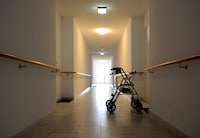Government policies aimed at curbing excessive use of powerful psychiatric drugs for dementia patients in nursing homes are probably having an unintended side effect: greater use of anti-seizure medications, a government report said Thursday.
Epilepsy drugs as ‘chemical restraint’ on rise in nursing homes

The OIG’s report studied prescribing patterns for drugs that work in the brain, called psychotropics. It focused on drugs given to nursing home residents from 2011 to 2019, measuring the effect of a government program begun in 2012 to reduce the widespread use of antipsychotic drugs in the facilities.
“Overall use of psychotropic drugs did not decrease but rather the use of psychotropic drugs shifted toward a different category,” the report stated.
It also found that nursing homes with fewer hours worked by a registered nurse, and those with more low-income residents, used measurably greater proportions of all categories of drugs that work in the brain, including antidepressants.
The analysis highlights a long-standing issue: how nursing homes often do not provide the most appropriate care for residents with dementia.
“The inappropriate use of dangerous and powerful medications hasn’t really changed, and that is really disturbing,” said Richard Mollot, executive director of the Long Term Care Community Coalition, a group that is critical of industry practices.
On one hand, nursing homes must keep patients and caregivers safe from violent behavior that jeopardizes them or others. But too often, experts say, patients with dementia are drugged as a matter of convenience for the nursing home staff or to reduce annoying behavior, not for safety reasons.
In response to a campaign launched in 2012 by the Centers for Medicare and Medicaid Services (CMS), which regulates nursing homes, use of antipsychotic drugs declined from 31 percent of nursing home residents to 22 percent from 2011 to 2019, the OIG report found. But in the same period, the use of anticonvulsants rose from 28 percent of residents to 40 percent, it said.
A report published this month in the Journal of the American Geriatrics Society made similar findings. It said two anticonvulsant drugs were increasingly being used in nursing homes, valproic acid, or valproate, which is known under the brand names Depakote and Depakene, and gabapentin, also known as Neurontin, which has frequently been prescribed for pain.
Critics of the practice, known as “chemical restraint,” say it is inhumane if not practiced appropriately.
“You want them to have the best quality of life possible and approach care in a positive and respectful way that gives people dignity,” said Ryan Carnahan, a University of Iowa professor and expert in the use of psychiatric drugs for elderly patients. “To just snow them and knock them out is not the outcome we should be going for.”
The nursing home industry, represented by the American Health Care Association/National Center for Assisted Living, said Thursday that it has been participating for years in efforts to reduce the use of psychiatric drugs for nursing home residents. The industry has touted its track record of reducing use of antipsychotics over the past decade.
In response to the latest OIG findings, the AHCA pointed to the complexity of the problem. “Many residents are already on these medications when they are admitted to the nursing home from the community or hospital, and physicians or family members are concerned about ceasing their use,” David Gifford, AHCA chief medical officer, said in an emailed statement.
Physicians not affiliated with nursing homes also prescribe the medications, he said.
“We ardently support increasing education about the proper use of psychotropic drugs among nursing home residents with dementia and have asked CMS and others to expand its outreach to physicians, hospitals, community settings, and families,” Gifford said.
No drugs have been approved to treat dementia caused by Alzheimer’s or other brain diseases. Physicians are permitted to prescribe medications “off label,” which means for conditions outside their approved use.
But the use of drugs to sedate dementia patients exposes them to dangerous potential side effects. Antipsychotics carry a “black box” warning from the Food and Drug Administration because of the risk of stroke, heart attack, diabetes, parkinsonism and falls. Some anticonvulsants carry the risk of liver toxicity and inflammation of the pancreas.






